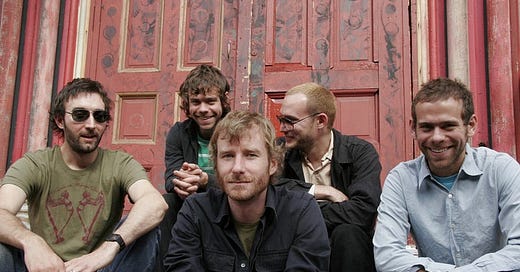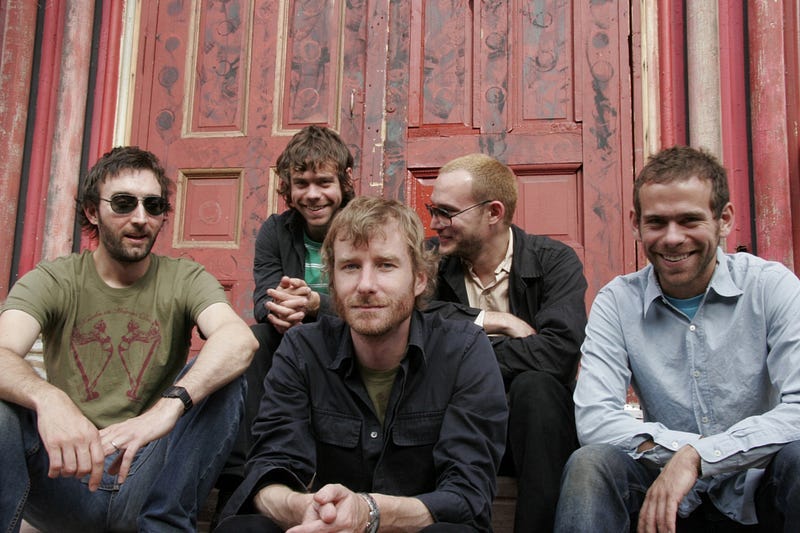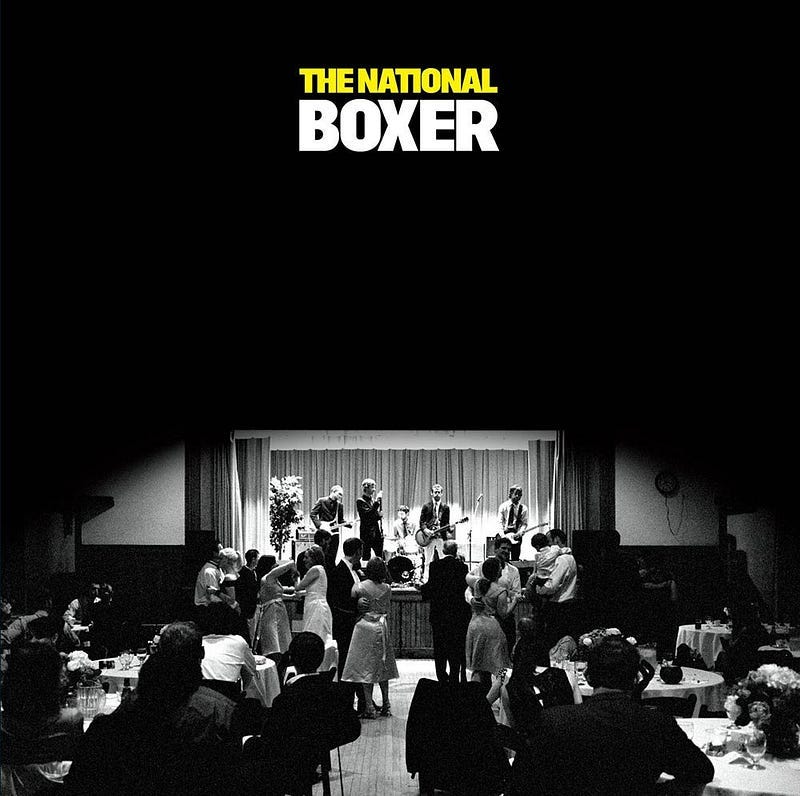The National are a band of New Yorkers transplanted from Cincinnati, Ohio: Matt Berninger, Aaron Dessner, Bryce Dessner, Bryan Devendorf, and Scott Devendorf. What each member of the band does is not that important, but what they do together seems increasingly more so…
When last we heard from The National, they’d released and toured behind their Beggars Banquet debut, Alligator, an album whose reception closely mirrored the kind of sounds they made on record — it started out quiet, and ended up very, very loud. Alligator became one of the most widely discussed and critically acclaimed independent albums of 2005 — “album of the year” to one Los Angeles Times critic. It also earned top marks in a poll of America’s bloggeratti and rapturous reviews throughout the U.S. and Europe. (Uncut, selecting it as an album of the month, called the record “their first masterpiece.”) More importantly, The National became an object of growing obsession among a thriving community of fans — strands of their lyrics decorated MySpaces; during shows, audience members sang along in unison, echoing through concert halls; news of celebrity admirers like Bruce Springsteen shot across the interwebs. The National became famous in an alternate universe — one where the gossip rags talk about the people you actually care about.
Boxer is better.
Gothic in its detailing but jaunty in its execution, Boxer is something far richer than orch-pop (translation: rock ’n’ roll topped with violins). Rather, the band find ways to combine the expressive depth of composed music with the urgency of pop. It’s a sound built with guitar, bass, piano and drums and festooned with brass, woodwinds, backing vocals, strings, and organs. A product of dedicated labor, happenstance, and alchemical reactions, the music reveals new layers with each successive listen.
There are nods toward a host of iconic Americans — F. Scott Fitzgerald, Raymond Carver, composer Steve Reich, Bob Dylan and the Band, Jonathan Ames (especially Wake Up, Sir!), even a bit of Grateful Dead. There are sketchy suggestions of Leonard Cohen, Grace Paley, Nick Cave, John Ashbery, The Smiths and Tom Waits. But The National’s pedigree is becoming harder and harder to trace. They may remind you of distinguished ancestors but, now, The National sound like no one so much as themselves: a meditative rumble that starts in the heart, gets caught in the brain, and resonates outward.
Australian composer Padma Newsome of Clogs coordinates the fleet of orchestral details — he’s one vital part of an extended family that has expanded in recent years to include producer Peter Katis; beloved live engineer Brandon Reid; writer and guest lyricist Carin Besser; and French artist Mathieu Saura (a.k.a. Vincent Moon). New contributors include Thomas Bartlett (a.k.a. Doveman), Brooklyn singer Marla Hansen, and neighborhood friend Sufjan Stevens.
***
When asked to describe Boxer, The National makes reference to “a euphoric disconnection,” the lovely delusion that sets in after too much dulling reality, too much time away, and losing touch with friends.
As usual, the lyrics eschew narrative in favor of associative images, bits of overheard conversation, or slivers of interior monologue re-arranged into a new language unique to the band. There are diamond slippers and ballets on ice, G.I. blood and fake empires, blue blazers and white-shirted professionals. The band sings about the kind of dreams that ruin lives, and they make of those dreams the kind of music that saves them. A glowing young ruffian retires from his dream life, shoots up the corporate ladder, develops womanly hands…
What exactly is The National going on about? Why are songs about love and war intertwined with songs about money and office life? Are these songs about all those topics at once? The only certain thing is that, like boxers, The National are making their way in a rough trade — a sport, a pastime, a violent thing. They get cut up and caught up in the ropes. They rip out the stitches though friends urge them not to.
I won’t lie. The National’s music is not easy to describe, but it’s very easy to listen to. It’s an antidote for uneasy times. Spend an hour with Boxer, and you’ll end up spending many more.
Originally used as the pre-release bio for the album. May have also been published at www.brassland.org. That was a long time ago…




